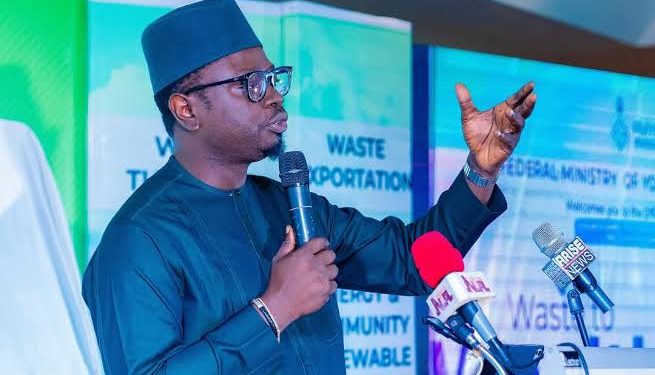The Federal Government has launched the Circular Economy Youth Empowerment Initiative (CEYEI), a programme designed to address youth unemployment, strengthen economic growth, and promote environmental sustainability. The initiative is being implemented through the Federal Ministry of Youth Development in partnership with SAMU Technology and the Recyclers Association of Nigeria (RAN).
Speaking at the launch in Abuja, the Minister of Youth Development described CEYEI as a landmark achievement under the administration’s Renewed Hope Agenda, noting that the programme goes beyond job creation to raise a new generation of innovators, entrepreneurs, and nation-builders.
At the centre of the initiative is the flagship Waste to Wealth Project, which aims to transform waste into valuable eco-friendly products while creating sustainable green jobs for Nigerian youth. The programme will provide participants with hands-on training, mentorship, and access to green technologies, as well as opportunities to showcase innovations in local and international markets. A dedicated Waste to Wealth online platform has also been introduced as a hub for registration, networking, investment access, and market expansion.
The Minister highlighted other complementary programmes of the Ministry, including the Nigerian Youth Academy (NIYA) focused on youth protection and capacity-building, digital literacy training in partnership with the National Information Technology Development Agency, and the recent launch of “YO! Health”, a mental health and wellness hub. He further announced the rollout of the Youth Cred Scheme in partnership with Credit Core, designed to expand access to loans for young people and lay the groundwork for a Youth Bank, MSME Incubator, and National Innovation Hub. Ongoing reforms of the National Youth Service Corps (NYSC) were also mentioned as part of efforts to align the scheme with the aspirations of today’s youth.
CEYEI will be implemented nationwide, covering all 36 states and more than 774 local government areas, with inclusivity as a core principle to ensure that young people across diverse regions and backgrounds have equal access to opportunities.
The Minister of State for Humanitarian Affairs and Poverty Reduction, Yusuf Sununu, stressed that Nigeria is grappling with a humanitarian crisis affecting more than three million people and facing a global funding gap of $36 billion. He urged stakeholders to invest in youth-led waste-to-wealth initiatives that can create jobs, reduce poverty, and build national resilience.
The Permanent Secretary of the Youth Ministry, Olubunmi Olusanya, said the initiative is designed to tap into the creativity and entrepreneurial drive of Nigerian youth, empowering them to turn discarded materials into viable economic opportunities. Representatives of the Recyclers Association of Nigeria described the launch as a demonstration of Nigeria’s commitment to positioning young people as drivers of change rather than passive beneficiaries of development.
By reducing waste, reusing resources, and recycling materials, the CEYEI programme is expected to expand Nigeria’s circular economy, lower emissions, and give young Nigerians a stronger role in advancing climate action and sustainable growth.










